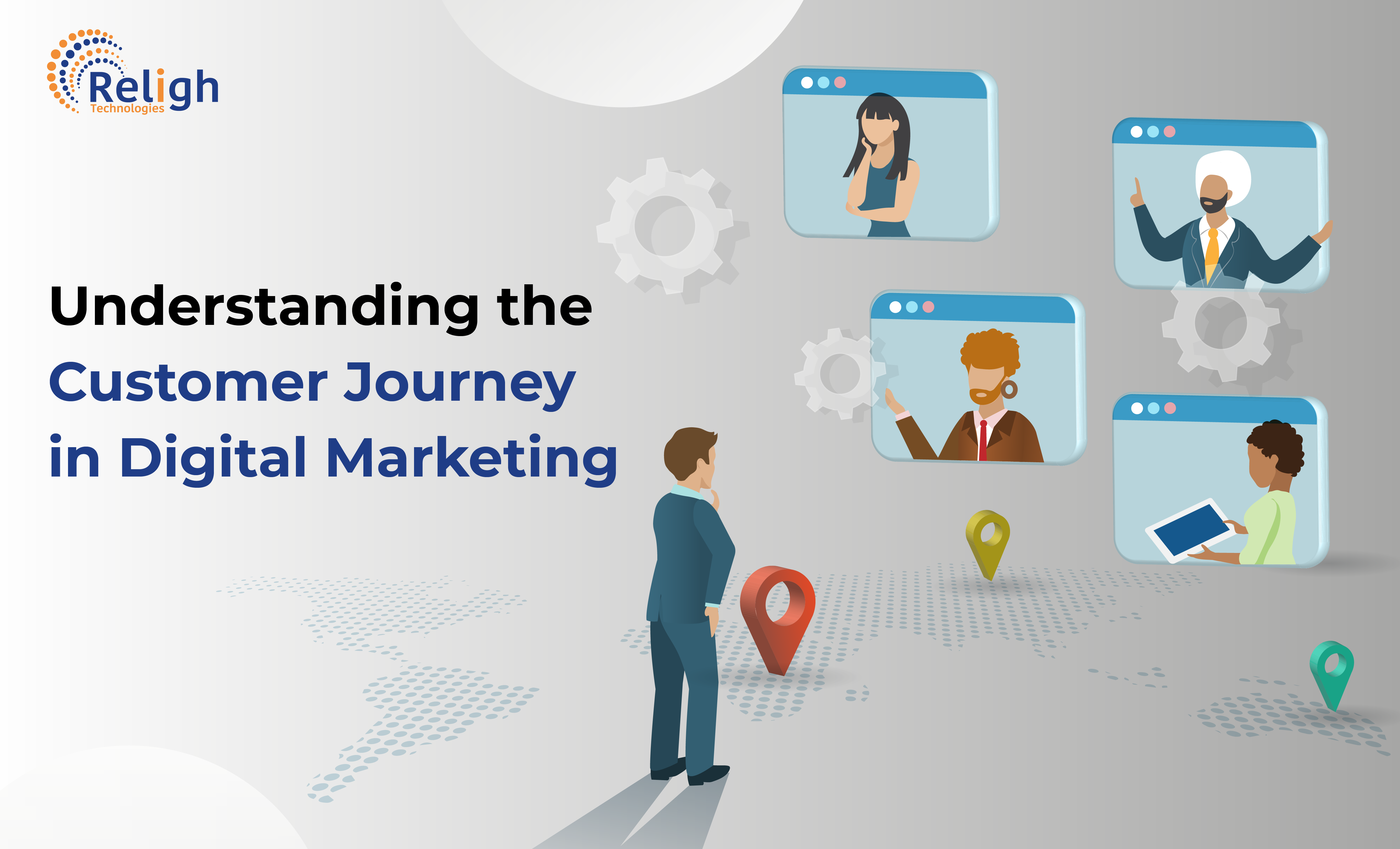In the world of digital marketing, the best digital marketing companies in Bangalore understanding the customer journey is vital for SEO professionals. The customer journey refers to the process a customer goes through from the moment they become aware of a product or service to the point of making a purchase and beyond.
By understanding each stage of the customer journey, SEO professionals can tailor their strategies to attract and engage potential customers, ultimately driving more traffic and improving search engine rankings.

Stages of the Customer Journey
- Awareness Stage
- Create informative and engaging content that addresses the needs and problems of potential customers.
- Utilise keyword research to optimise content for search engines and increase visibility.
- Leverage social media platforms and online advertising to reach a wider audience.
- Website traffic and unique visitors
- Click-through rates (CTR) from search engine results pages
- Social media engagement and reach
- Consideration Stage
- Create high-quality and informative content that highlights the unique value proposition of your brand.
- Optimise content for relevant keywords and provide in-depth information to educate and convince potential customers.
- Implement targeted ad campaigns to capture the attention of potential customers during their research phase.
- Time spent on page and bounce rate
- Conversion rates for opt-in forms or lead magnets
- Social proof indicators, such as online reviews and testimonials
- Decision Stage
- Provide clear and compelling calls-to-action (CTAs) to encourage conversions.
- Optimise landing pages and checkout processes for a seamless user experience.
- Implement remarketing campaigns to remind potential customers of your brand and drive conversions.
- Conversion rates for purchases or desired actions
- Cart abandonment rates
- Average order value and customer lifetime value
- Loyalty Stage (Post-purchase)
- Continue to provide valuable and relevant content to nurture and engage existing customers.
- Offer personalised recommendations and exclusive offers to increase customer loyalty.
- Encourage customers to leave reviews and share their experiences on social media platforms.
- Customer retention and repeat purchase rates
- Customer satisfaction and Net Promoter Scores (NPS)
- Social media mentions and engagement.
The awareness stage is the initial phase of the customer journey, where the customer becomes aware of a specific need or problem. Customers in this stage may not yet be aware of your brand or the products and services you offer.
Strategies and Tactics for SEO Professionals to Target the Awareness Stage
Key Metrics to Track during this Stage
The consideration stage is when potential customers are actively researching and considering different options to solve their needs or problems. In this stage, customers may be comparing different brands, products, or services.
Strategies and Tactics for SEO Professionals to Target the Consideration Stage
Key Metrics to Track during this Stage
The decision stage is the point where potential customers are ready to make a purchase or take a specific action. Customers in this stage have narrowed down their options and are evaluating the best fit for their needs.
Strategies and Tactics for SEO Professionals to Target the Decision Stage
Key Metrics to Track during this Stage
The loyalty stage occurs after a customer has made a purchase or completed a desired action. Customers in this stage have become loyal customers and can potentially become brand advocates.
Strategies and Tactics for SEO Professionals to Target the Loyalty Stage
Key Metrics to Track during this Stage
By understanding the customer journey in Digital marketing Services In Bangalore for SEO, professionals can adapt their strategies and tactics at each stage to meet the needs and expectations of potential customers. By doing so, SEO professionals can increase brand visibility, drive more targeted traffic, and ultimately improve search engine optimisation efforts. So, seize the opportunity to understand your customers better and enhance your SEO efforts for success in the digital landscape.

Mapping the customer journey
Understanding the customer journey is crucial for search engine optimisation (SEO) professionals to excel in the digital world. By mapping the customer journey, SEO experts can gain valuable insights into their target audience, identify touchpoints, and create personalised and targeted content to optimise their SEO strategies.
- Identifying and understanding buyer personas
- When it comes to mapping the customer journey, buyer personas play a key role. Buyer personas are fictional representations of ideal customers based on market research and real data. By understanding these personas, SEO professionals can enhance their understanding of the target audience’s needs, preferences, and behaviours at each stage of the customer journey.
- Creating buyer personas helps SEO experts identify pain points, motivations, and goals, allowing them to tailor their strategies accordingly. By aligning SEO efforts and content creation with buyer personas, professionals can create a more effective customer journey map.
- Creating effective buyer personas involves research and analysis. SEO professionals can start by gathering information through customer surveys, interviews, and analysis of available data. This data can include demographic information, behaviour patterns, preferences, and pain points.
- Once the data is collected, SEO professionals can create detailed profiles, including information such as age, gender, job title, hobbies, and challenges. These profiles should be specific enough to provide a clear picture of the target audience while being flexible enough to accommodate different types of customers.
- Touchpoints and channels
- Touchpoints refer to the moments when the customer interacts with a brand or its marketing efforts. These touchpoints can occur through various channels such as social media, email marketing, website visits, or offline interactions.
When mapping the customer journey, identifying and analysing touchpoints is essential. SEO professionals need to understand the touchpoints at each stage of the customer journey to ensure consistent messaging and a seamless user experience. - Not all channels are relevant at every stage of the customer journey. SEO professionals need to carefully choose the channels to engage with customers based on their preferences and behaviours at each stage.
For example, social media might be more effective for creating brand awareness and generating leads, while email marketing might be more suitable for nurturing and converting leads into customers. - Content mapping
- Content plays a vital role in the customer journey as it guides and influences customers at each stage. SEO professionals must align their content with each stage of the journey to ensure relevance and effectiveness.
At the awareness stage, the content should focus on creating brand awareness and capturing the attention of potential customers. In the consideration stage, the content should provide information and solutions to address customer pain points.
Finally, at the decision stage, the content should focus on encouraging conversions and showcasing the value of the product or service. - Personalisation is key in today’s digital marketing landscape. SEO professionals should leverage the buyer personas and customer data to create personalised and targeted content. By understanding the target audience’s preferences, challenges, and motivations, professionals can tailor content to resonate with the specific needs of each individual.
Personalised content can include customised emails, website content, blog posts, social media posts, and more. By providing relevant information and addressing specific pain points, SEO professionals can enhance engagement and conversions throughout the customer journey.
Wrapping Up
The digital marketing landscape is ever-evolving, and SEO professionals must be willing to adapt and learn continuously. Hence, by effectively guiding potential customers through each stage of the journey, businesses can increase visibility, attract qualified leads, and achieve their conversion goals. And in this journey, Digital marketing agency in Bangalore can provide valuable support in navigating this dynamic environment.
At last, continuous learning and adaptation are essential in an ever-changing digital landscape, ensuring that marketers stay at the forefront of their field and drive tangible business results.

